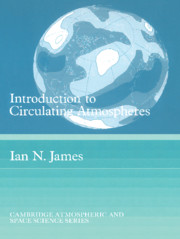Book contents
- Frontmatter
- Contents
- Preface
- Notation
- l The governing physical laws
- 2 Observing and modelling global circulations
- 3 The atmospheric heat engine
- 4 The zonal mean meridional circulation
- 5 Transient disturbances in the midlatitudes
- 6 Wave propagation and steady eddies
- 7 Three-dimensional aspects of the global circulation
- 8 Low frequency variability of the circulation
- 9 The stratosphere
- 10 Planetary atmospheres and other fluid systems
- Appendix: Solutions to Problems
- Bibliography
- References
- Index
Preface
Published online by Cambridge University Press: 14 January 2010
- Frontmatter
- Contents
- Preface
- Notation
- l The governing physical laws
- 2 Observing and modelling global circulations
- 3 The atmospheric heat engine
- 4 The zonal mean meridional circulation
- 5 Transient disturbances in the midlatitudes
- 6 Wave propagation and steady eddies
- 7 Three-dimensional aspects of the global circulation
- 8 Low frequency variability of the circulation
- 9 The stratosphere
- 10 Planetary atmospheres and other fluid systems
- Appendix: Solutions to Problems
- Bibliography
- References
- Index
Summary
The wind blows where it wills; you hear the sound of it, but you do not know where it comes from, or where it is going. (John, 3, 8)
In the ancient world, the question of where the wind came from and where it was going to was one of life's unanswerable puzzles. Indeed, so unpredictable and unknowable was the wind, that the evangelist used it as an elaborate pun on the inscrutable purposes of God's Spirit (in the Greek of the New Testament, the same word means ‘wind’ and ‘spirit’). Meteorology of any sort must have been a most frustrating study. Hints of regular patterns emerged, only to vanish on closer inspection. Wise saws about the weather were wrong as often as they helped. And if you were a farmer, a sailor or a campaigning soldier, guessing the winds or the weather wrongly could lead to disaster. Truly, through the weather and the winds, the gods played with man, teased and tormented him, and confirmed their authority.
And here matters more or less rested until the Newtonian revolution of the seventeenth century. By then, many different aspects of the natural world had been reduced to reproducible laws. Kepler showed how the motions of the planets were governed by strict rules, although he did not quite succeed in explaining why his laws of planetary motion had the forms they did.
- Type
- Chapter
- Information
- Introduction to Circulating Atmospheres , pp. xi - xviiiPublisher: Cambridge University PressPrint publication year: 1994



